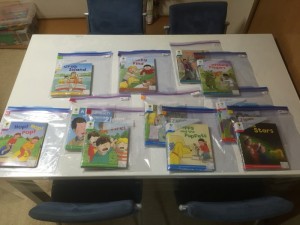Stocktake!
Counting, Sorting, Checking
We spent the last couple of days counting and organizing books at Cambridge.
This gave us a chance to check all the books were in packs, the packs were labelled correctly, and CDs etc. were in the right place.
It also showed the gaps in our library. I am aiming for at least four packs of each of our ‘core’ sets, and right now we don’t have that -I feel a large book order coming up 😉
We also had a chance to reorganize our shelves to make classes run a bit more smoothly.
Right now our collection broadly looks like this:
YL: #books
0.1: 377
0.2: 384
0.3: 587
0.4: 396
0.5: 401
0.6: 345
0.7: 303
0.8: 183
0.9: 170
1.0: 149
1.1: 276
1.3: 140
1.5: 190
2.0: 190
2.5: 55
3.0: 100
4.0: 85
5.0: 7
6.0: 9
7.0+: 5
Total: 4352 (we also have a couple of hundred books that haven’t been processed yet, or that are sets missing books. I hope to get those integrated soon)
The lower levels (YL 0.1-1.0) consist mainly of sets. We have 1-6 of each set of core books, and mostly one or two sets for supplementary books (see this post for more detail about core and supplementary).
My experience with ER is that libraries are never finished, and it always feels like there aren’t enough books. At the moment the Cambridge library is adequate for our needs (around 60 student in the Academy program, along with about ten who are just borrowing books) but as students move into the intermediate level (YL 1.1+) we’re going to feel the pinch.
We’re also lacking at the advanced level. So another year or two of book buying on the horizon.
Actually, who am I kidding? We probably have decades of book buying on the horizon 🙂
This is one reason I am not too worried about competition in this space. In order to create a similar program, a competitor would need the know-how, millions of yen, and the confidence/desire to make it work.
Our current collection, assembled over the last 13 years, is probably worth well over 3 million yen and we are still ploughing back a big chunk of revenue into books.
Even if someone did manage to create a competitor program in our area, I think there are enough students in Sendai to go around.
I’ll be writing a post about how to start from scratch next, so don’t be discouraged if you don’t have any books or budget right now.
curriculum extensive reading high school junior high school school management
by sendaiben
2 comments
Cambridge Academy: Looking at Year Two
Still Evolving at a Rapid Rate
Since I wrote my last post a few weeks ago the program has continued to evolve. This will just be a quick update as we head towards the spring break and our planned stocktake and preparation for next year.
Conceptual Breakthrough
The most exciting development is a conceptual breakthrough I had a couple of weeks ago. As our library expanded, we continued buying more of our existing books, as well as new series. The new books mostly worked, but some are a better fit for our students than others. We started to run out of shelf space, and my reading checklists were getting crowded.
I also had to decide if we were going to buy multiple sets of the new books. If we did, would we continue making most students read all the books at each level? Even if the number of books at each level continued to grow?
Our system was getting twisted out of shape.
Then I had a conceptual breakthrough. It seems really obvious now, but it took me a while to spot it. We actually have two kinds of books in our lower level collection: core books, which most students should read, and supplementary books, which can be given to students that might enjoy them or need extra practice. We need multiple sets of core books, but only single copies of supplementary books. There should be a limited number of core books, but we can pretty much buy anything as a supplementary book.
In practice this means that most students will read the core books. Some students will read supplementary books if they need more practice at a certain level. Others may read supplementary books if they seem like they would enjoy them.
This breakthrough has made it easier to think about and plan the program.
Testing
We have decided to introduce a number of tests to the Academy in order to provide us with data, to motivate and encourage students, and to reassure parents.
We held the TOEFL ITP (pre-TOEFL) last week at the school. Unfortunately, and somewhat ironically given my rant post about using Eiken tests appropriately, we gave it to all our students, including the JHS ones. This was a mistake as it was far too hard for some of them.
In the future we will only use the TOEFL with our more advanced students.
We are also planning to use the JUMP and ACE tests from ELPA (for JHS and SHS students respectively) twice a year in April and December.
This will cost money and take class time, but I think it will help motivate students by showing them their progress and give our school and program more respectability.
Preparing for Next Year
Before April, we need to:
- do a stocktake and find out how many copies/sets of each book we have
- add missing book information to our database
- order more books to fill in gaps in our collection
- prepare new student files and checklists
- buy more CD players (a couple have broken)
- think about the interior design of the reading classroom (it’s fine as it is but I would like it to be more welcoming, comfortable, and relaxing)
The Academy from 2016 will have around 60 students. This is far fewer than I was hoping for, but broadly in line with my expectations.
In my experience it takes a few years for word of mouth about a program to take off, and the nature of an ER-based system is that results take years not months to emerge. I am still hopeful that our enrolment will take off in a year or two (year three or four of the program).
Wish us luck!
Doing Stuff: the Art of Productivity
Cross-posting!
I wrote a long post about productivity on my personal finance blog today. Wasn’t really sure which blog to put it on (it kind of fits both) so cross-posting here.
Check it out!
REVIEW: Oxford Decode and Develop (ORT)
One of my favourite additions to the Oxford Reading Tree
I’m a big fan of the Oxford Reading Tree series, and it forms the core of our beginner extensive reading program.
I’ve always felt the core stories were the best part of it, with additional components such as Floppy’s Phonics, Songbirds, and Fireflies good but not always maintaining the same level of story interest.
However, recently we bought a full set of the Oxford Decode and Develop series for ORT, and I am really impressed.
The stories feature the main characters and seem to be story based, with a similar level of interest as the ‘trunk’ books.
The good
Same ORT characters and fun storylines
Audio available online for free
Phonics-based, so slightly easier to read for EFL students
The bad
The artwork seems slightly different
Er, that’s it
Overall
The content is more stand-alone and not really integrated with the trunk stories (this could be good or bad, I guess)
Big thumbs up from me

Some of my favourites (yes, I like Floppy)
The following packs are available:
Level 1 (wordless): two packs
Level 1+: two packs
Level 2: two packs
Level 3: two packs
Level 4: two packs
Level 5: two packs
Level 6: one pack
Level 7: one pack
Level 8: one pack
Level 9: one pack

You can see most of our collection here (some packs are on loan). We put each pack in a ziplock bag with its CD.
So I consider ODD to be a healthy addition to an ORT ER library. I would get the core stories first, but this is a good way to expand them if you want more of the similar.
Young Children and STEP Eiken
Unprofessional and Irresponsible
I’m going to be blunt here. I believe forcing young children to take the STEP Eiken test has a high chance of being pointless, counter-productive, and even irresponsible.
Yesterday I got involved in a debate on Facebook after someone reposted an update from the owner of an English immersion kindergarten announcing one of their six-year-olds had passed the pre-2 Grade of the STEP Eiken test. They also mentioned this same kindergarten had been in the news a while back for having a six year old pass the pre-1 Grade test.
Now, I don’t have a problem with the STEP Eiken test. My wife’s school is an Eiken test centre and I have been involved with various aspects of the test for the last decade. I think it does a perfectly good job of what it was designed to do: certify that (mainly) junior and senior high school students have acquired the grammar and vocabulary they are taught in school. The tests are designed to match up to school years as follows:
Grade 5 Eiken -> finished JHS 1st grade English
Grade 4 Eiken -> finished JHS 2nd grade English
Grade 3 Eiken -> finished JHS 3rd grade English
Grade pre-2 -> mid-SHS English
Grade 2 -> finished SHS English
Grade pre-1 -> university equivalent English
Grade 1 -> high proficiency in English for professional use
The tests seem to be most useful when applying to high school or university, or when working as an English teacher or public servant. It’s been around for a long time, and is probably the best-known English qualification in Japan.
Which brings us to young children.
Many parents, not knowing better, have an impression of Eiken as a general English test. In their eyes, passing Eiken means that someone has a certain English ability. They then decide that it would be good for their children to pass Eiken earlier than usual.
Now, for some students, taking the STEP Eiken test slightly early is not a bad thing. For the right student who is ready, it can be a confidence boost, a way to get used to taking tests, and a way to show parents that students have acquired some English skills.
The problem arises when parents take it too far and push their children into taking it too soon.
Pointless
There is no point in taking the Eiken test very early. It is mainly used for recommended entry into high schools (passing the Grade 3 or pre-2 test displays a mastery of junior high school English) or universities (Grade 2 shows a mastery of high school English, while pre-1 or 1 show advanced English proficiency).
Passing the test at a very early age confers no advantage, and now that the tests have an expiry date on them just means that students will have to take them again nearer the time they will need to use them.
The only reason I can think of to take tests early is so that parents or schools can brag about it.
Counter-productive
It can be stressful and uncomfortable for children to prepare for tests they are not ready for developmentally. Pencil use, writing their name and address, and filling in mark sheets correctly are all difficult for younger children. Beyond Eiken pre-2, the content of the tests takes an academic turn. Questions refer to social and environmental issues. Written and spoken tests expect a certain format for answers. Forcing children to conform to this is wasting time that could be used to learn English more appropriately, through stories, play, and interaction with teachers and peers.
I had a young boy come to an Eiken speaking test once and ask me in beautifully accented English to fill in his test card for him, because he couldn’t write his name and didn’t know his phone number. He failed the test as he didn’t seem to understand that it was a test and couldn’t stay on point. His English was beautiful but he wasn’t ready to take a highly structured test.
Another time I was ‘helping’ a ten-year old boy who had spent a long time in the US with the Eiken 2. As we worked through past papers, it became clear that he didn’t know the concepts, let alone the vocabulary, for a lot of the questions. It was heartbreaking, but at that time I didn’t have the experience or the confidence to stand up to his parents.
Irresponsible
I believe schools and teachers have a duty to educate parents about the nature and purpose of tests so that they can make appropriate decisions regarding their children. Failing to do so, in my eyes, makes a teacher or school unprofessional, irresponsible, and even negligent.
There are a number of English tests developed specifically for young children, such as the Cambridge YLE, junior UN Eiken, or junior STEP Eiken tests. Students can also show their skills through performance, in-class assessment, or creating portfolios of their work. With so many appropriate alternatives, please think carefully before putting the wishes of parents or your own commercial interests ahead of what is best for each child.
What do you think? Am I being too harsh? Are there any good reasons for having very young children take the STEP Eiken?







